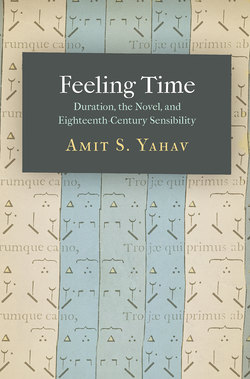Feeling Time

Реклама. ООО «ЛитРес», ИНН: 7719571260.
Оглавление
Amit S. Yahav. Feeling Time
Отрывок из книги
Feeling Time
Duration, the Novel, and Eighteenth-Century Sensibility
.....
The first chapter of this book considers the associationist and sensationist logics of eighteenth-century empiricism and their bearings on discussions of time. I begin by examining how Locke and Hume not only attend to our knowing time, but also identify duration with a consciousness that feels time and, more specifically, whose feelings of duration and about duration vary by intensities and compositional arrangement. If Gilles Deleuze reads Hume’s account of human nature as a fully developed temporal phenomenology, in this chapter I discover the conditions of possibility for Hume’s phenomenological approach in Locke’s analysis of human understanding. I then turn to considering how these models of a temporalized consciousness are developed in Addison’s and Diderot’s comments on the durational makeups and effects of discursive compositions. Addison and Diderot emphasize that the compositional dimensions of durational experience and the qualities that these dimensions generate are made—that in preferring certain forms to others, writers shape the temporal experience of readers and can cultivate particular temporal qualities. Addison comments on relations between discursive compositions and time in a number of his Spectator pieces, presenting leisure reading as a means for evoking varying feelings by way of varying compositional principles. Such shaping of durational experience, according to Addison, constitutes the aesthetic pleasure of literature. Diderot brings this approach to bear on novels. According to Diderot, the pleasures of Richardson’s novels arise from their combining conversational immediacy with lengthy narratives—a peculiar digressiveness that promotes attention to durations that we often overlook in our ordinary rush toward worldly achievements.
After this initial examination of eighteenth-century philosophy and popular essays, each of the subsequent chapters looks at a specific formal dimension of novels and considers the way it features the sensibility chronotope. Techniques of plot serve to develop solutions for difficulties of judging in time—the challenging assessment of action in medias res, while action continues to roll on to its destination and collide with other actions that divert it from its intended course—as well as to give readers occasions for experiencing the durationality of judgment. Techniques of narration serve to raise solutions for the difficulties of emotional attachments, helping to sustain love and sympathy for others through long durations by way of shared rhythms. And techniques of characterization engage the difficulty of bundling disjointed experiences into continuous identity, drawing on aesthetic theories that highlight the crafting of holistic durations out of disparate momentary stimulation and offering instances of aesthetic immersion as occasions for cultivating such continuous subjectivities.
.....